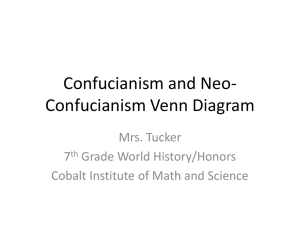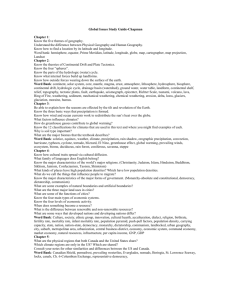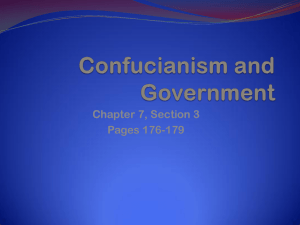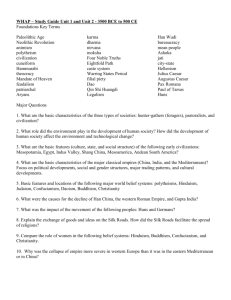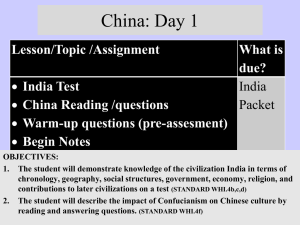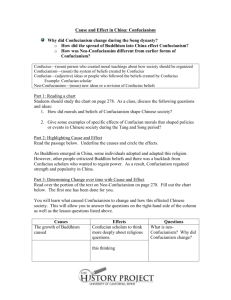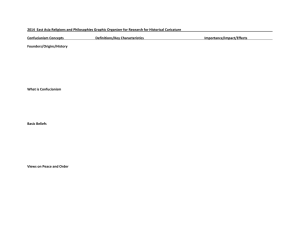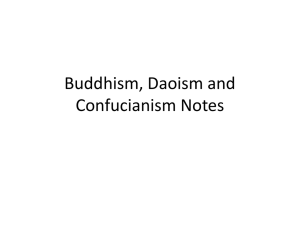What is Neoconfucianism and how does it related to the imperial era
advertisement
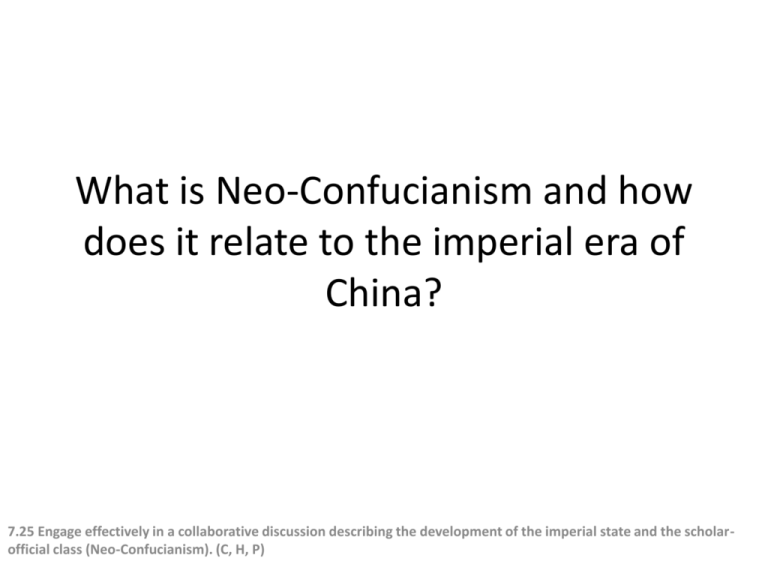
What is Neo-Confucianism and how does it relate to the imperial era of China? 7.25 Engage effectively in a collaborative discussion describing the development of the imperial state and the scholarofficial class (Neo-Confucianism). (C, H, P) What do you already know about any of the following? Civil service exams imperialism Taoism Neo- bureaucracy Confucianism Buddhism Scholar-officials Term Imperial “neo-” NeoConfucianism Taoism Hint Definition Term Imperial “neo-” NeoConfucianism Taoism Hint Definition of or relating to an empire. Term Imperial “neo-” NeoConfucianism Taoism Hint Definition of or relating to an empire. new Term Imperial “neo-” NeoConfucianism Taoism Hint Definition of or relating to an empire. new A rebirth of Confucius’ original thoughts that focused on loving everyone, being social, and setting your personal bar high; a movement derived from Confucianism in China around AD 1000 in response to the ideas of Taoism and Buddhism. Term Imperial “neo-” NeoConfucianism Taoism Hint Definition of or relating to an empire. new A rebirth of Confucius’ original thoughts that focused on loving everyone, being social, and setting your personal bar high; a movement derived from Confucianism in China around AD 1000 in response to the ideas of Taoism and Buddhism. a Chinese philosophy based on the writings of Lao-tzu (500s BC), advocating humility and religious piety; the “way” The will to win, the desire to succeed, the urge to reach your full potential... these are the keys that will unlock the door to personal excellence. Real knowledge is to know the extent of one's ignorance. Choose a job you love, and you will never have to work a day in your life. He who learns but does not think, is lost! He who thinks but does not learn is in great danger. Silence is a true friend who never betrays. Ignorance is the night of the mind, but a night without moon and star. It does not matter how slowly you go so long as you do not stop. Our greatest glory is not in never falling, but in getting up every time we do. What the superior man seeks is in himself; what the small man seeks is in others. I am not one who was born in the possession of knowledge; I am one who is fond of antiquity, and earnest in seeking it there. If a man takes no thought about what is distant, he will find sorrow near at hand. Learning without thought is labor lost; thought without learning is perilous. Recompense injury with justice, and recompense kindness with kindness. The cautious seldom err. The superior man cannot be known in little matters, but he may be entrusted with great concerns. The small man may not be entrusted with great concerns, but he may be known in little matters. The superior man is modest in his speech, but exceeds in his actions. Things that are done, it is needless to speak about…things that are past, it is needless to blame. Reflection Explain. As you read his quotes, did any of them resonate with you? Did you think of a particular person or even how it relates to yourself? Why do you suppose Confucius was considered so wise by so many? What are the dangers in living closely by Confucius’ suggestions? What was Neo-Confucianism? Taoism + Confucianism + Buddhism + =Neo-Confucianism What was Neo-Confucianism? Taoism + Confucianism + Buddhism + Different sects. =Neo-Confucianism What was Neo-Confucianism? Taoism + Confucianism + Buddhism + Different sects. Chinese see Siddhartha Gautama as just one of many Buddhas. =Neo-Confucianism What was Neo-Confucianism? Taoism + Confucianism + Buddhism + Different sects. Chinese see Siddhartha Gautama as just one of many Buddhas. Use the Tipitaka and sutras (parables). =Neo-Confucianism What was Neo-Confucianism? Taoism + Confucianism + Buddhism + Different sects. Chinese see Siddhartha Gautama as just one of many Buddhas. Use the Tipitaka and sutras (parables). Believe you can participate in society (not have to be a monk) and reach nirvana (enlightenment). =Neo-Confucianism What was Neo-Confucianism? Taoism + Confucianism + Buddhism + Different sects. Chinese see Siddhartha Gautama as just one of many Buddhas. Use the Tipitaka and sutras (parables). Believe you can participate in society (not have to be a monk) and reach nirvana (enlightenment). 4 Noble Truths (eliminate suffering) =Neo-Confucianism What was Neo-Confucianism? Taoism + Confucianism + Buddhism + Different sects. Chinese see Siddhartha Gautama as just one of many Buddhas. Use the Tipitaka and sutras (parables). Believe you can participate in society (not have to be a monk) and reach nirvana (enlightenment). 4 Noble Truths (eliminate suffering) 8 Fold Path (Code for living) =Neo-Confucianism Summarize 1s- According to Taoism, suffering is caused by… 2s- According to Buddhism, you can reach enlightenment if… 3s- According to Confucianism, the world will be in harmony if… What was Neo-Confucianism? Taoism + Confucianism + Buddhism + =Neo-Confucianism The amalgamation, or uniting of, Taoism, Confucianism, and Buddhism. What was Neo-Confucianism? Taoism + Confucianism + Buddhism + =Neo-Confucianism The amalgamation, or uniting of, Taoism, Confucianism, and Buddhism. Tendency to seek “harmony” in all things—in this case, to try to synthesize complex religious and philosophical views into a pattern worth studying. Read “The First Emperor” Junior Scholastic April 28, 2008 Guiding question: How was an “imperial” China different than China before imperialism? Sentence Starters Answer in your spiral. Raise your hand when you are ready to have it checked. Neo-Confucianism is… Chinese imperialism era had rulers called… Connect to prior lessons— Neo-Confucianism’s role in imperial bureaucracy was… 7.25 Engage effectively in a collaborative discussion describing the development of the imperial state and the scholarofficial class (Neo-Confucianism). (C, H, P)
